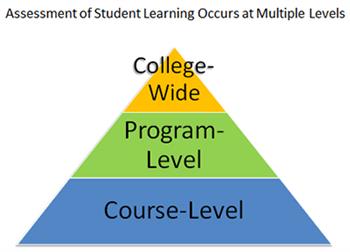Assessment of Student Learning Outcomes
What is Assessment?
Assessment is the process by which we deliberatively and systematically collect information about student learning. This information is important in knowing whether Hilbert College is fulfilling its mission of educating students in liberal arts and professional programs to become informed citizens committed to serving and strengthening their communities.
The process of assessment provides measureable outcomes to evaluate our success in achieving that mission and to make informed decisions as we constantly strive to improve student learning outcomes at all levels of the institution.
Assessment of student learning serves two primary purposes: improvement and accountability.
Assessment for Improvement:
- Help students learn more effectively
- Assessment activities bring faculty and staff together to discuss important issues
- Help faculty & staff see how courses are linked together
- Results provide feedback on what's working and what needs to be changed
- Brings neglected issues to the forefront
- Helps faculty & staff make better decisions and use limited resources more wisely
Assessment for Accountability:
- Requirement for accreditation
- Evidence to present to administrators and Board of specific programs' value and quality
- Evidence of quality & value to use in asking alumni, foundations, other donors to invest
- Evidence of quality & value to encourage prospective students (& parents) to enroll
- Can provide prospective employers with evidence that students graduate with needed knowledge and skills
How Do We Assess Student Learning?
Assessment of student learning is a continual process that occurs at multiple levels throughout the college community. Our goal is to develop and nurture a culture of assessment at Hilbert in which the values of continuous improvement and accountability to our students, their families and our community are deeply embedded in all activities of the faculty and staff.
Levels of Assessment

College-Wide Level:
We look at broad goals based on Hilbert’s mission called Liberal Learning Outcomes. These are outcomes we want all students to achieve as a consequence of being a Hilbert graduate. At this level the college regularly participates in nationally based assessment programs such as the Collegiate Learning Assessment (CLA), the National Survey of Student Engagement (NSSE), the Beginning College Survey of Student Engagement (BCSSE), as well as using assessment tools and strategies developed locally and specifically for our own purposes.
Program Level:
The faculty within each of Hilbert’s undergraduate and graduate degree programs have identified specific outcomes that all students in that major need to know or should be able to do by the time they are ready to graduate. Other academic and nonacademic programs, such as the First-Year-Experience and Student Life, have likewise identified important goals or outcomes for students.
Each year these programs select particular outcomes for assessment and develop strategies for measuring and evaluating those outcomes. The results are then made available for use by the faculty and staff for further improvement.
Course Level
Finally, assessment also occurs at the level of each course. Every instructor of every course taught at Hilbert develops her or his own set of expected outcomes for that course, the most important information, skills, values, that each student should gain from successfully completing the course.
Beyond just assigning grades at the end of the semester, instructor are also gathering information throughout the course to inform them of the success of the assignments, projects, readings, lectures, etc., in helping the students achieve those outcomes. This type of assessment is directly applied to continually revising course materials and instructional techniques to benefit students the next time the course is taught.
The findings from these three levels are integrated to provide an overall picture of student learning at Hilbert College and to inform decision-making and actions by faculty, administrators and staff toward achieving our mission.